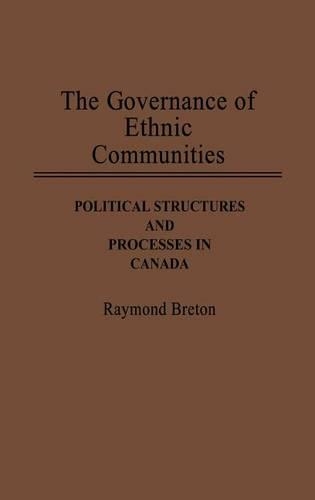
The Governance of Ethnic Communities: Political Structures and Processes in Canada
(Hardback)
Publishing Details
The Governance of Ethnic Communities: Political Structures and Processes in Canada
By (Author) Raymond Breton
Bloomsbury Publishing PLC
Praeger Publishers Inc
29th November 1990
United States
Classifications
Tertiary Education
Non Fiction
Anthropology
Social and ethical issues
Political structure and processes
305.800971
Physical Properties
Hardback
208
Width 156mm, Height 235mm
510g
Description
Greenwood Press' "Contributions in Ethnic Studies" series focuses on the interactions and outcomes, both positive and negative, of people from different cultures and their often dissimilar expectations and goals. In "The Governance of Ethnic Communities", Raymond Breton examines Chinese, German, Italian, Spanish, Portuguese, Ukrainian, and West Indian communities in Canada, with occasional references to the "native peoples" and other ethnic communities in that country and in the United States. These groups' respectively unique cultural and historical matrices, coupled with their status in the dominant social structure, furnish provocative and diverse data and serve as the bases for scholarly generalizations. From a previously rather underdeveloped perspective, Breton looks at the ethnic community as a stateless political entity with political structures and political processes for self-governance, arguing that although these groups have no state institutions, they do have public ones. He also highlights the processes of collective decision-making, how participation and resources are mobilized for collective projects, the relationship between elites and members, conflict management, and the exercise of power in manging community affairs. The relevant community affairs are both "internal" matters, such as cultural events, educational and religious activities, or aid to new immigrants, and "external" affairs, such as immigration legislation and its implementation, civil rights, and relations with the country of origin. The volume's eight chapters explore the origin and structures of governance; examine some of the processes of governance, including community leadership and the formulation of collective goals; and inquire into the construction and maintenance of the sociopolotical community through an investigation of individual participation in community affairs and of the group's collective identity. Throughout this analysis, Breton considers the impact of environmental forces and of internal political competition.
Reviews
Breton (sociology, University of Toronto) offers a study that explores how ethnic groups in Canada govern their activities within the larger polity. The author is not interested in a situation like Quebec, in which one national minority is so concentrated in a particular area as to constitute a majority. Rather, Breton discusses such minority groups as Jews, Ukrainians, Chinese, Italians, and others to investigate how they retain, or fail to retain, their distinctive character, social values, and political processes. The author is interested in such topics as the forms that collective decision-making takes, how the ethnic population and its resources are mobilized, how competing interests are reconciled and conflicts managed, how elites and members interact, and what sorts of ethnic organizations emerge as dominant. Breton's study is specific to Canada of course, although it might have some applicability to similar ethnic groups living in other nations. This is an interesting, theoretical study that would be of value to political sociologists concerned about ethnic issues. Graduate level.-Choice
"Breton (sociology, University of Toronto) offers a study that explores how ethnic groups in Canada govern their activities within the larger polity. The author is not interested in a situation like Quebec, in which one national minority is so concentrated in a particular area as to constitute a majority. Rather, Breton discusses such minority groups as Jews, Ukrainians, Chinese, Italians, and others to investigate how they retain, or fail to retain, their distinctive character, social values, and political processes. The author is interested in such topics as the forms that collective decision-making takes, how the ethnic population and its resources are mobilized, how competing interests are reconciled and conflicts managed, how elites and members interact, and what sorts of ethnic organizations emerge as dominant. Breton's study is specific to Canada of course, although it might have some applicability to similar ethnic groups living in other nations. This is an interesting, theoretical study that would be of value to political sociologists concerned about ethnic issues. Graduate level."-Choice
Author Bio
RAYMOND BRETON is Professor of Sociology at the University of Toronto. He has co-authored Cultural Boundaries and the Cohesion of Canada and Ethnic Identity and Equality: Varieties of Experience in a Canadian City. His research interests are in the social structure and culture of Canadian society, with special attention to ethnicity, language, and intergroup relations. He is a Fellow of the Royal Society of Canada.
